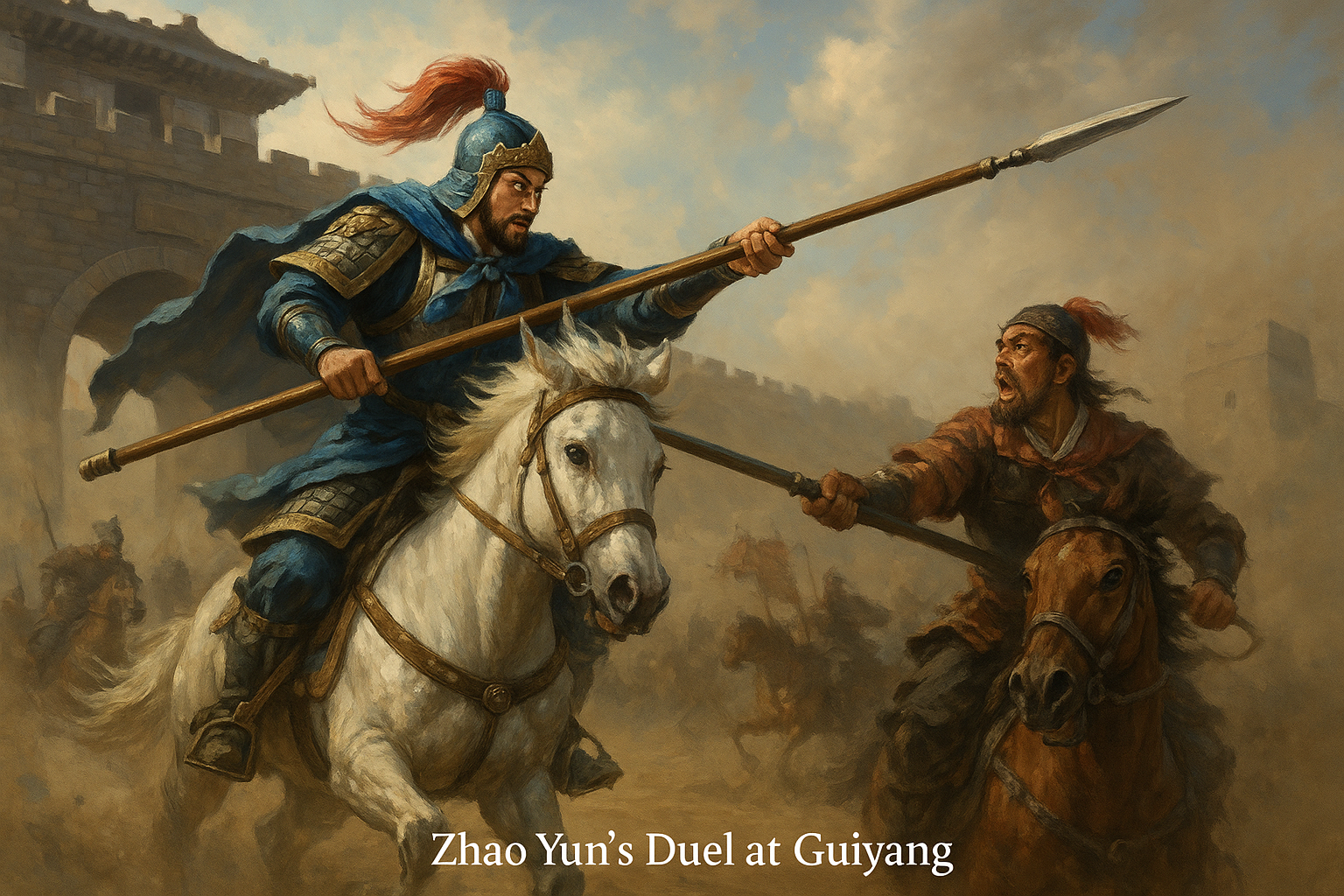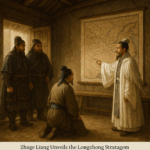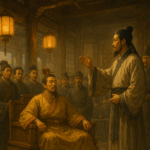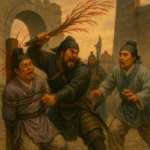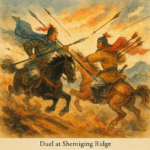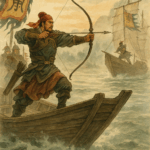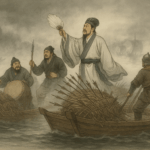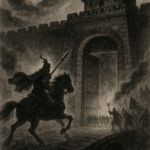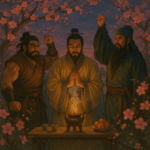Zhou Yu was furious when he learned that Zhuge Liang had seized Nan Commandery—and then Jing and Xiang as well. His anger aggravated his arrow wound; it took him some time before he could recover. His officers urged him to calm himself, but Zhou Yu raged, “If I do not execute that rustic Kongming, how can I ease my resentment? Cheng Pu can help me retake Nan Commandery—then East Wu will recover what’s ours!”
Just then, Lu Su arrived. Zhou Yu declared, “I mean to march against Liu Bei and Zhuge Liang together, settle this once and for all, and reclaim our cities. Will you join me?” Lu Su replied, “No. We are still locked in stalemate with Cao Cao and must first resolve Hefei. If we fight among ourselves, Cao’s forces will seize the opportunity. Besides, Liu Bei once stood with Cao Cao; if pressed, he may hand over our cities and join Cao then. What shall we do?”
Zhou Yu retorted, “It stings that they use our toil and blood while reaping the spoils for themselves!” Lu Su counseled patience: “Let me ride to speak with Liu Bei. If persuasion fails, we can fight afterward.” The officers agreed.
Immediately, Lu Su and his escort rode to Nan Commandery. Arriving at the walls, he called for entry. Zhao Yun appeared and said, “My lord Liu Bei and his strategist are in Jingzhou City.” Lu Su rode on to Jingzhou, where banners flew and the army was in full array. Admiring the display, he thought, “Kongming truly is no ordinary man.”
Riding to the gate, he requested to see Liu Bei. Zhuge Liang ordered the gates thrown open, and Lu Su was led into the yamen. After formal greetings and tea, Lu Su spoke bluntly:
“Lord Sun instructed me repeatedly to tell Your Excellency: previously, Cao Cao led a million men south to seize you. Thanks to East Wu’s intervention, he was repelled and you were saved. Now you hold the nine commanderies of Jingzhou—but in truth they belong to East Wu. You have used trickery to seize Jing and Xiang, wasting Wu’s men, horses, and supplies, while reaping the benefits yourselves. This is unjust.”
Zhuge Liang smiled: “Sir, you speak well—but the axiom says that “things return to their rightful owner.” These nine commanderies were once the fief of Liu Jingsheng; he is my lord’s elder brother. Though Jingsheng has died, his son still lives. As uncle to nephew, is it not fitting that we hold Jingzhou?”
Lu Su countered: “If Liu Qi were here, one might argue that he is the rightful heir. But the young lord is in Jiangxia, not Jingzhou.”
“Would you like to see him?” Zhuge Liang asked. At a word, two attendants brought forth Liu Qi from behind a screen. The prince, upon seeing Lu Su, apologized: “My illness prevents proper courtesy; forgive me, sir.”
Lu Su was struck silent for a long while before saying, “If the prince is here, so long as he remains, he may garrison and defend. But if he goes, you must return the cities to East Wu.”
Zhuge Liang nodded gravely: “Sir’s words are noted.” A feast was held, and Lu Su rode back through the night to report all.
Zhou Yu seethed: “Liu Qi is just a boy, still in his youth—how could he die so soon? When will Jingzhou return to us?”
Lu Su smiled: “Trust me. Leave this matter to me, and I will restore Jing and Xiang to East Wu.”
Zhou Yu pressed, “What is your plan?”
Lu Su replied, “Observe Liu Qi’s condition: he is consumed by wine and women, ill beyond cure, pale and wasted, coughing blood. He cannot survive six months. When he dies, Liu Bei will have no pretext to hold Jingzhou.”
Zhou Yu’s resentment softened as he sent an envoy home to recuperate. Sun Quan summoned him to Hefei and ordered him to bring his fleet and troops to reinforce the defenses there under Sun Quan’s command.
Meanwhile, Liu Bei, now master of Jingzhou, Nan Commandery, and Xiangyang, rejoiced and began planning his long-term strategy. One day Yi Ji presented himself in court. Grateful for past kindness, Liu Bei welcomed him and asked his counsel. Yi Ji said, “For the long-term security of Jingzhou, you must seek out capable advisers.”
Liu Bei asked, “Where might I find them?”
Yi Ji replied, “The five Ma brothers of Jing and Xiang are famed for talent; the youngest is named Su (courtesy name Youchang), and the most brilliant is Ma Liang (courtesy name Jichang), marked by a white forelock. There is a saying, ‘Of the five Ma brothers, White Brow is the best.’ Why not invite him to plan with you?”
Liu Bei agreed. When Ma Liang arrived, Liu Bei received him with full honors and asked how best to hold Jing and Xiang. Ma Liang counseled, “Jing and Xiang are surrounded on all sides; they cannot be held forever. My advice: send Prince Liu Qi to recover from his illness here, and have him bear the title Inspector of Jingzhou to reassure the people. Meanwhile, launch southern campaigns to take the four commanderies of Wuling, Changsha, Guiyang, and Lingling, stockpiling supplies as your base. This is the long-term strategy.”
Liu Bei beamed: “Which should we take first?”
Ma Liang answered, “On the west bank of the Xiang River lies Lingling, closest to us—capture it first. Then take Wuling, followed by Guiyang to the east bank, and Changsha last.”
Liu Bei appointed Ma Liang as his principal secretary with Yi Ji as his deputy, dispatched Zhuge Liang to escort Liu Qi back to Xiangyang, and ordered Zhang Fei to lead the vanguard, Zhao Yun to follow, himself as center guard, with fifteen thousand troops. He left Guan Yu in Jingzhou and assigned Mi Zhu and Liu Feng to hold Jiangling.
In Lingling, the prefect Liu Du, hearing of Liu Bei’s approach, conferred with his son Liu Xian. Xian said, “Father, do not fear. Though Zhang Fei and Zhao Yun are valiant, we have our commander Xing Daorong—he can hold ten thousand men at bay.”
They marched out thirty li to a riverbank camp. Scouts reported Zhuge Liang’s arrival, and Daorong led his men out to challenge him. At the clash of arms, Daorong swung his great axe, shouting, “Rebels! How dare you invade our lands?”
From behind the formation emerged a cluster of yellow banners—and a four-wheeled ceremonial cart carrying a man in scholar’s garb, feather fan in hand. He called out, “I am Zhuge Kongming of Nanyang. Cao Cao’s million troops were scattered by my stratagems. How can you stand against me? Surrender now.”
Daorong laughed and charged the cart, but the attendants whipped it away. Daorong followed, splitting his forces in two, but the car vanished, and in its place appeared General Zhang Fei on horseback, brandishing his spear. Daorong met his blade but was soon overwhelmed and forced to flee; Zhang Fei’s hidden troops sprang the trap, and Daorong fled for his life.
Yet beyond the hills lay another banner—this one bearing Zhao Yun’s crest. Daorong charged on it but was confronted by Zhao Yun himself, who thundered, “I am Zhao Yun of Changshan! Do you not recognize me?” Daorong, trapped, surrendered. They brought him before Liu Bei and Zhuge Liang, who ordered him executed—then Zhuge Liang stayed his hand:
“If you can capture Liu Xian, you may join us.”
Daorong eagerly agreed: “Tell me your plan, and I will do it.”
Zhuge Liang asked, “How would you capture him?”
Daorong replied, “Tonight, you will assault the city. I will act as your insider, seize Liu Xian, and deliver him to you. Then his father will surrender.”
Liu Bei doubted, but Zhuge Liang said, “Trust him.” They released Daorong. That night, Daorong and Liu Xian laid their ambush: they lit torches and set fire outside the camp, then, as the defenders rushed out, stormed in and pursued them ten li. When they returned, they found Zhang Fei awaiting them in the smoke. Daorong urged, “Do not return—let us instead storm Kongming’s camp.”
They rode toward Zhuge Liang’s encampment, but Zhao Yun led a force of cavalry through a hidden pass, pierced Daorong’s horse with his lance, and scattered the pursuers. Daorong turned and fled, running into Zhang Fei’s charge—only to be captured and brought to Zhuge Liang. Breathing hard, Daorong protested, “I was forced into this by Xing Daorong, not by my own will!”
Zhuge Liang ordered him freed, clothed, and given wine to recover. He sent him back to persuade his father to surrender—warning that if Liu Du refused, the city would be stormed and every family executed.
Liu Du, hearing this, agreed to submit. They hoisted the white flag on the walls and sent the official seals to Liu Bei’s camp. Zhuge Liang retained Liu Du as prefect and invited Liu Xian to serve under him. The people of Lingling rejoiced.
Liu Bei entered the city to pacify it and then honored the three armies with rewards. He turned to his generals and asked, “Lingling has been taken—who will claim Guiyang?”
Zhao Yun volunteered: “I will.”
Zhang Fei stamped: “And I!”
Zhuge Liang interposed: “Since Zhao Yun spoke first, let him go.”
Zhang Fei objected hotly: “I need no help! Give me three thousand men, and I will take it alone.”
Zhao Yun said calmly, “So will I—if I fail, I accept all consequences.”
Pleased, Zhuge Liang drafted an oath of service and entrusted Zhao Yun with three thousand elite troops. Zhang Fei fumed, but Liu Bei silenced him.
The next morning, Zhao Yun led his detachment to Guiyang. The prefect Zhao Fan, alarmed, convened his officers Chen Ying and Bao Long, both expert hunters and warriors. They urged resistance, but Zhao Fan pointed out that Zhao Yun had broken the siege at Changban with ease—and that Guiyang was no match. Chen Ying demanded a fight, and Zhao Fan reluctantly agreed.
They arrayed their troops outside the gate. Zhao Yun rode out alone on horseback, brandishing his spear, and rebuked Chen Ying: “My lord Liu Bei is the brother of the late Liu Jingsheng, and Prince Liu Qi leads Jingzhou. We come only to comfort the people—why do you resist?”
Chen Ying spat, “We serve Cao Cao, not you!”
Zhao Yun leapt forward, and after four or five exchanges, Chen Ying wheeled to flee. Zhao Yun pursued, caught his flying lance, and returned it to him. Seizing the moment, he unhorsed and captured Chen Ying.
Riding into the city, Zhao Yun commanded, “Chen Ying fought me once—let him go, but beg Prefect Zhao Fan to surrender.”
Chen Ying fled to the walls, and in a rage Zhao Fan reproached him for forcing battle. He despaired and surrendered, sending the seals to Zhao Yun.
Zhao Yun received his surrender with courtesy, held a banquet, and then escorted him back to Liu Bei’s camp.
Liu Bei and Zhuge Liang arrived at Guiyang to find Zhao Fan presented under guard. When Zhao Fan recounted how his sister Fan Shi had proposed marriage, Zhuge Liang inquired, “Why did you refuse her?”
Zhao Yun explained, “To wed his sister would scandalize the camp; she would lose her virtue, and he, newly surrendered, might prove treacherous. Our ruler’s realm is not yet secure; how could I risk it for one woman?”
Liu Bei smiled approvingly: “You are a true hero.” He pardoned Zhao Fan, reappointed him prefect, and bestowed great rewards on Zhao Yun.
At this, Zhang Fei bellowed, “Since Zhao Yun wins all the glory, what do I bring to the table? Give me three thousand men to take Wuling, and I will capture Prefect Jin Xuan!”
Zhuge Liang laughed: “Winged Brave, you may go—but on one condition…”
Thus ends the chapter.
